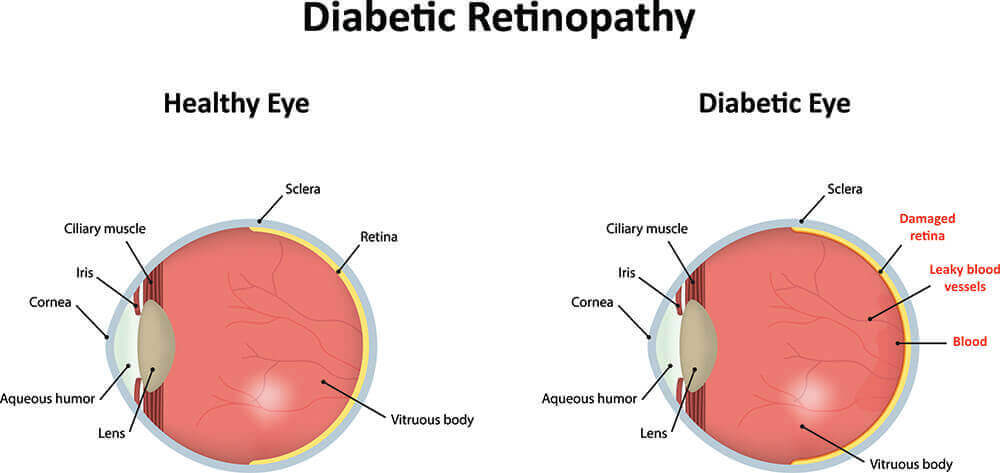Diabetic retinopathy is a condition that refers to damage in the blood vessels of the retina located at the back of the eye. It can occur in individuals with Type 1 or Type 2 diabetes and is contributed to high blood sugar levels. This causes the blood vessels in the eye to leak or swell, and in some cases, new blood vessels can grow on the retina. If left untreated, symptoms can begin to worsen over time and diabetic retinopathy can even lead to blindness. At Nevada Eye Physicians, our highly skilled physicians provide diagnostic testing and treatment for diabetic retinopathy for their Nevada patients.

Causes and Symptoms
Diabetic retinopathy is a direct result of having diabetes, where chronic high blood sugar episodes have caused damage to the blood vessels in the retina. The retina is a layer of tissue found in the back of the eye which consists of light-sensitive tissue that is responsible for detecting light. In turn, diabetic retinopathy can lead to diabetic macular edema (DME), which causes fluid to build up in the central portion of the retina (known as the macula), which can lead to vision problems.
While there are usually no symptoms in the early stages of diabetic retinopathy, symptoms can gradually progress. Common symptoms are:
- Vision problems, including distortion and blurriness
- Decrease in visual acuity (sharpness)
- Appearance of floaters
- Vision loss
- Decreased color vision
Diagnosis
Diabetics should regularly have routine comprehensive eye exams to check for any problems. We will use the visual acuity test, utilizing an eye chart to determine how well a patient can see at various distances. With tonometry, your physician will measure the pressure within the eye to see if there are any abnormalities. Pupil dilation widens the pupil so your doctor can get a better view of your retina to see what’s going on with the area. With optical coherence tomography (OCT), light waves are used to capture detailed images of the retina.
In certain cases, we may choose to use fluorescein angiography where you will be injected with a special dye that will go into your bloodstream. The fluorescent dye will highlight blood vessels in the retina to determine if any there’s any bleeding, leaking, or damage present.
Treatment and Prognosis
Drugs like corticosteroids are often given to patients suffering from diabetic retinopathy to alleviate symptoms, such as inflammation. The medications can be injected or implanted into the eye for a continuous delivery. Laser treatment uses innovative laser technology to target and burn the damaged and leaking blood vessels, preventing further leaking and minimizing inflammation. Anti-VEGF drugs may also be injected into the vitreous gel of the eye, which is a clear gel that fills the space between the lens and the retina. The drugs work to block a certain protein that is responsible for the growth of abnormal blood vessels which can leak fluid.
Although in certain cases there is no way to reverse vision loss or blindness, most patients can expect about a 95% reduction in the occurrence of blindness with an early diagnosis and proper treatment. Controlling diabetes by keeping blood sugar levels stable is one of the best ways to prevent or slow down the progression of diabetic retinopathy.
Treat Diabetic Retinopathy
It is especially important for diabetics in general and pregnant diabetic patients in particular to get routine eye exams to prevent complications. At Nevada Eye Physicians, we perform comprehensive eye exams for our diabetic patients to help diagnose diabetic retinopathy. To schedule your eye exam, contact one of our Nevada locations today.



